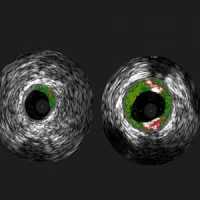A new analysis of an international clinical trial ("FAME 2") shows that percutaneous coronary intervention (PCI), along with prescribed medication, as initial treatment for patients with stable coronary artery disease is superior to standard medication therapy at five-year mark. The study was presented at EuroPCR 2018 in Paris and also published in the New England Journal of Medicine.
The five-year analysis of the FAME 2 trial indicates that initial PCI with medication led to a significant reduction in urgent hospital admissions and revascularisations to restore blood flow in the blood vessels of the heart, as compared to medication as the only treatment. The medication used in the FAME 2 trial consisted of a combination of aspirin, cholesterol-lowering and blood pressure-lowering drugs as required by current treatment guidelines.
PCI is a minimally-invasive procedure where modern stents – small tubular metal scaffolds coated with medication – are inserted into an artery using a small catheter to widen a narrowed blood vessel in the heart. PCI is commonly used to treat sudden blockages of a coronary artery that cause a heart attack.
In North America, the standard practice is to prescribe medication to patients with stable coronary artery disease and avoid PCI, according to senior author Dr. Peter Jüni, Director of the Applied Health Research Centre (AHRC) at the Li Ka Shing Knowledge Institute of St. Michael's Hospital.
"We used pressure measurements inside the heart arteries to find coronary arteries that should be widened," said Dr. Bernard De Bruyne, an interventional cardiologist at the Cardiovascular Centre Aalst in Belgium and the principal investigator of the trial. "With these measurements we were able to identify patients who would benefit from PCI in addition to medication."
Coronary artery disease is the most common type of heart disease in North America and Europe, and is a serious health problem worldwide. It occurs when the coronary arteries become narrow and hardened due to the build-up of cholesterol rich plaques in the blood vessels. Although the FAME 2 trial showed that PCI reduced urgent hospital admissions and revascularisations and likely reduced heart attacks, it did not provide evidence for a difference between PCI and medication alone in the prevention of deaths.
The trial was initially sponsored by St. Jude Medical, a global medical device company, until the three-year follow-up. The subsequent two years of follow-up have been academically driven, organised the by the academic steering committee of the study. Nineteen sites across Europe and North America participated in the five-year follow-up.
"Our trial over its entire follow-up shows us that the longer you observe these patients, the more pronounced the benefits of the initial PCI become," said Dr. Jüni, who is also a Canada Research Chair and a Professor of Medicine at the University of Toronto.
While Drs. Jüni and De Bruyne agree there is more research to be done using modern PCI technology, this five-year follow-up offers evidence that PCI has the potential to provide long-term benefits to patients with stable coronary artery disease.
Source: St. Michael's Hospital
Image Credit: Pixabay
Latest Articles
PCI, heart disease, percutaneous coronary intervention, coronary artery disease
A new analysis of an international clinical trial ("FAME 2") shows that percutaneous coronary intervention (PCI), along with prescribed medication, as initial treatment for patients with stable coronary artery disease is superior to standard medication th










